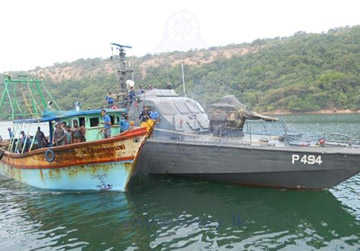|
Opinion: A sea of conflict
Tamil Nadu fishermen poaching in Sri Lankan waters
The Chennai based English daily 'The Hindu' in an article in its
publication on December 19 points out that Tamil Nadu fishermen entering
Sri Lankan waters interfere with the livelihood of Sri Lankan Tamils
struggling to make a living from the sea after the end of terrorism.
Satellite images have, beyond doubt, proved that Indian fishermen
frequently cross the agreed-upon International Maritime Boundary Line
(IMBL) that defines the two nations' fishing zones on either side of it.
The article appearing in the Op-Ed said that the argument that the
fishermen naively stray into Sri Lankan territory falls flat, for,
virtually all the trawlers found trespassing are equipped with GPS
monitors that would clearly indicate where they are headed.
 The writer, Meera Sirinivasan points out that though there were no
arrests reported that night, the Sri Lankan Navy, on several occasions
before and after that, have arrested Indian fishermen on charges of
trespassing. Not just in Analativu, but at different points off Sri
Lanka's northern and eastern coasts. The writer, Meera Sirinivasan points out that though there were no
arrests reported that night, the Sri Lankan Navy, on several occasions
before and after that, have arrested Indian fishermen on charges of
trespassing. Not just in Analativu, but at different points off Sri
Lanka's northern and eastern coasts.
Satellite images have, beyond doubt, established that Indian
fishermen frequently cross the agreed-upon International Maritime
Boundary Line (IMBL) that defines the two nations' respective fishing
zones on either side of it. However, many including Tamil Nadu
politicians, passionately argue in defence of the fishermen, usually on
three major grounds: that the fishermen erroneously stray into Sri
Lankan waters without intending to; that it would take time to deter
fishermen away from a zone where they traditionally held fishing rights;
and that it is, at the end of the day, about their livelihood.
Even if Indian fishermen traditionally held fishing rights across
Palk Strait earlier - they had the zone virtually to themselves during
Sri Lanka's 30-year civil war that ended in 2009 - four years is not too
short a time to change their course.
The idea of "traditional fishing rights" is also questionable,
particularly when Indian fishermen are found coming all the way around,
off the island's north-eastern coast, near Mullaitivu.
The moment news of an arrest is out, Tamil Nadu politicians put out a
strong statement condemning the "atrocity of the Sri Lankan Navy" and
urging New Delhi to take a strong position that is not diluted by its
diplomatic compulsions. All other political parties in Tamil Nadu share
the same position on the issue.
Soon, New Delhi assures Tamil Nadu that it would do its best to get
the fishermen released soon, a cue for backdoor diplomatic exchanges.
New Delhi and the Indian mission in Sri Lanka, in particular, seem to
have had a hard time throughout 2013 - caught between Tamil Nadu's
unreasonable demands and an increasingly strained diplomatic equation
with Sri Lanka that effectively weakens its leverage vis-...-vis pushing
for the rights of the Sri Lankan Tamils.
The Sri Lankan government, on its part, soon highlights how poaching
by Indian fishermen has severely affected the Sri Lankan economy. Some
forces within the Sri Lankan government also tend to use the fishing
conflict to bait the Tamil National Alliance (TNA), which formed the
northern provincial government recently, provoking it to take on Tamil
Nadu in this matter.
The Tamil Nadu government and Chief Minister Jayalalithaa, who has
been strongly criticising New Delhi for its stance, has, in the last few
years, taken no serious measures to deter its fishermen from poaching in
Sri Lankan waters.
If Tamil Nadu politicians care for Sri Lankan Tamils as much as they
claim to, how come they completely miss the larger point about Sri
Lankan Tamil fishermen being the worst-hit in this maritime mess?
If it is about Tamil Nadu fishermen's livelihood, what is it then,
for Sri Lankan Tamil fishermen on this side of Palk Strait who are
struggling to cope with the after-effects of a brutal war?
The year Two thousand and thirteen has shown that diplomatic
trade-offs can, at best, be a myopic response to an acute problem. If
the livelihood concern flagged by many is for real, then Tamil Nadu has
the biggest responsibility.
It has to change its strategy from resorting to unreasonable,
emotional outbursts to finding ways to equip its own fishermen in the
best, long-term interest of their livelihood by, say, offering training
in deep-sea fishing methods. It should actively discourage the fishermen
from crossing the IMBL.
The TNA might want to open up channels of communication with the
Tamil Nadu government to engage with it, particularly on the fisheries
conflict. An amalgam of Tamil political parties with varying degrees of
Tamil nationalism among its constituents, the TNA has repeatedly
emphasised how deeply it values the solidarity expressed by Tamil Nadu
in support of Sri Lankan Tamils. However, only an ongoing dialogue
between the party and Tamil Nadu will help get across certain specific
realities about Sri Lankan Tamils.
In conclusion the writer says that the fisheries issue had offered
new political space for the TNA provincial administration as well, even
if it does its bit, the future of several thousand fishermen in Sri
Lanka's Northern Province - in Jaffna alone there are nearly 20,000
Tamil-speaking fishermen whose lives are tied to the sea - is, clearly,
in Tamil Nadu's hands.
Courtesy: defence.lk
|

